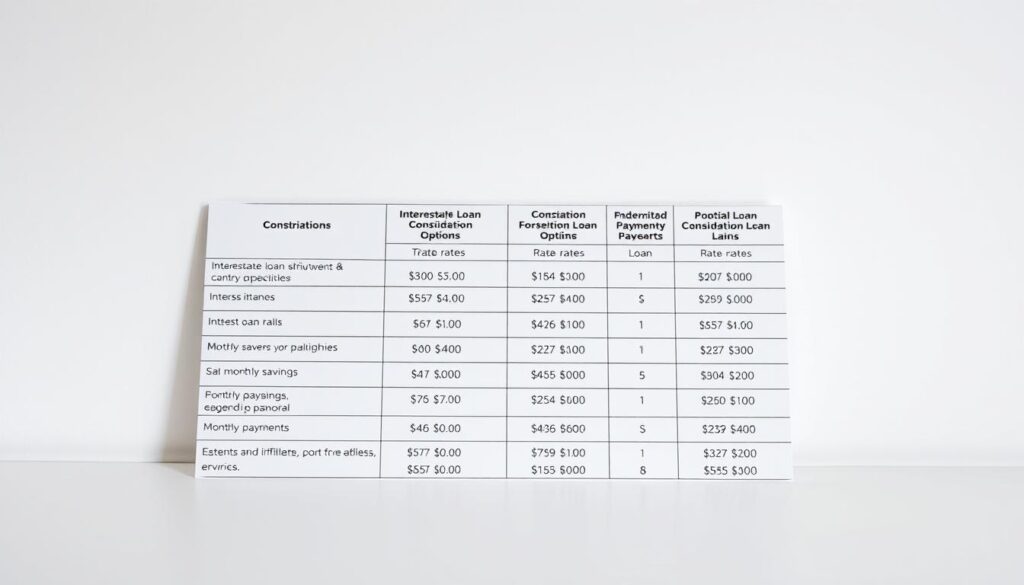Consolidate Debt with Flexible Loan Options
Did you know that nearly 30% of Americans have multiple debts? This makes it hard to manage their money. A debt consolidation loan can help. It lets you merge many debts into one loan with just one monthly payment.
Managing many debts can feel like a big burden. By combining them into one loan, you can make your finances simpler. You might also pay less in interest, saving you money. This smart choice can help you take back control of your money.
Learning about consolidation loans and their benefits can help you plan your financial future. We’re here to help you understand how to manage your debt effectively. This way, you can find the right loan for your needs.
Key Takeaways
- Simplify your finances by combining multiple debts into one loan.
- Potentially lower your interest rates and save money over time.
- Regain control over your financial health with a single monthly payment.
- Make informed decisions about your financial future.
- Benefit from flexible loan options tailored to your needs.
What Are Consolidation Loans?
Consolidation loans are a way to make paying off debt easier. They let you combine many debts into one loan. This loan usually has a lower interest rate and only one monthly payment.
This makes it simpler to handle your debt. By combining debts, you avoid the hassle of keeping track of many due dates and interest rates.
Definition and Purpose
A debt consolidation loan is made to pay off debts with high interest, like credit card balances. Its main goal is to save money on interest and make paying off debt easier.
The loan pays off your current debts, leaving you with just one loan to worry about. This can mean lower monthly payments and less stress about money.
How They Work
When you get a consolidation loan, the lender gives you a big sum to pay off your debts. Then, you pay back the loan in monthly installments, usually at a fixed interest rate.
The process includes several steps: applying, getting approved, and repaying the loan. Here’s a quick look at how consolidation loans work in a table:
| Step | Description |
|---|---|
| Application | You apply for a consolidation loan, providing financial information. |
| Approval | The lender reviews your application and approves the loan based on your creditworthiness. |
| Debt Consolidation | The loan amount is used to pay off your existing debts. |
| Repayment | You repay the consolidation loan through monthly installments. |
Getting a personal loan for debt consolidation can really help with managing debt. It lets you merge different debts into one easy-to-handle loan.
Types of Consolidation Loans
Consolidation loans vary to meet different financial needs. Knowing these options helps you choose the right one for you.
Secured vs. Unsecured Options
Secured and unsecured loans are two main types. Secured loans need collateral, like a house or car. If you can’t pay back, the lender can take it. Unsecured loans don’t need collateral, but might have higher interest rates.
Federal vs. Private Loans
Federal and private loans differ too. Federal loans come from the government and often have better terms. They might have lower interest rates and flexible repayment plans. Private loans come from banks and can have different terms. They might have higher rates but offer larger amounts.
Debt Management Programs
Debt management programs (DMPs) are another choice. DMPs are repayment plans made with credit counseling agencies. They can lower interest rates and fees but might hurt your credit score.
To understand these options better, let’s look at a comparison table:
| Loan Type | Collateral Requirement | Interest Rates | Repayment Terms |
|---|---|---|---|
| Secured Consolidation Loan | Required | Generally Lower | Varied, potentially longer |
| Unsecured Consolidation Loan | Not Required | Generally Higher | Varied |
| Federal Consolidation Loan | Not Required | Fixed, Generally Lower | Flexible, Income-Driven Plans |
| Private Consolidation Loan | May be Required | Varied | Varied |
Benefits of Consolidation Loans
For many, consolidation loans are a beacon of hope in a sea of debt. They offer a way to manage and stabilize finances.
Lower Monthly Payments
One big advantage of consolidation loans is lower monthly payments. This comes from longer repayment periods or lower interest rates. It means less financial stress and easier budgeting.
For example, combining high-interest debts into one lower-rate loan saves a lot. This frees up money for other important expenses or savings.
Simplified Finances
Dealing with many debts can be overwhelming. There are so many due dates, rates, and amounts to keep track of. Consolidation loans make this easier by combining debts into one loan with one payment. This reduces the chance of missing payments and incurring late fees.
- Reduced complexity in managing debts
- One monthly payment instead of multiple
- Clearer financial outlook
Improved Credit Score Potential
Consolidating debt can also help improve your credit score over time. By lowering your credit use and making on-time payments, you show good credit habits.
Also, paying off debts through consolidation can lower credit inquiries and remove negative marks. As you manage your debt better, your credit score will show it.
Who Should Consider Consolidation Loans?
Many people find consolidation loans a simple way to get back on track financially. We’ll look at who benefits the most from these loans.
Individuals with Multiple Debts
Those with many debts often feel overwhelmed. A debt consolidation loan can help by merging all debts into one. This means just one monthly payment.
“Consolidating your debts can reduce the stress associated with managing multiple creditors.”
This makes managing money easier and less stressful.
Those Facing High-Interest Rates
Those with high-interest debts can save a lot with consolidation loans. These loans often have lower rates. This can cut down on interest costs over time.
For example, a consolidate credit card debt loan is great. It combines many credit card balances into one with a lower interest rate.
People Seeking Financial Stability
Those looking for financial stability can also benefit. Consolidation loans can reduce monthly payments and lower interest rates. This helps manage finances better and work towards long-term financial health.
Consolidation loans offer a clear path to financial stability. They let individuals focus on other financial goals.
How to Apply for a Consolidation Loan
To consolidate your debts, knowing how to apply for a consolidation loan is key. The process has several important steps. These steps can make managing your finances easier.
Research and Compare Lenders
First, research and compare lenders when applying for a consolidation loan. Look at different consolidation loan options from banks and online lenders.
Compare interest rates, loan terms, and fees to find the best consolidation loans for you. Also, check the lender’s reputation and customer reviews to make sure they’re trustworthy.
Gather Necessary Documentation
Before you apply, make sure to gather all necessary documentation. Lenders usually need proof of income, identification, and details about your debts.
Having these documents ready can make the application process smoother. It shows you’re ready and responsible to lenders.
Submit Your Application
After choosing a lender and preparing your documents, it’s time to submit your application. Make sure to fill out the form correctly and completely.
Any mistakes can slow down the loan process. Some lenders let you apply online, which can speed things up.
Key Factors to Consider
To pick the best consolidation loan, we need to look at several key points. When checking out consolidation loans, don’t just glance over the surface.
Interest Rates and Terms
The interest rate on a low interest consolidation loans greatly affects the loan’s cost. It’s smart to compare rates from various lenders to get the best deal.
It’s also crucial to understand the loan’s terms. This includes how long you’ll pay it back and if you can adjust your payments.
| Lender | Interest Rate | Repayment Term |
|---|---|---|
| Lender A | 6.5% | 5 years |
| Lender B | 7.0% | 7 years |
| Lender C | 6.0% | 5 years |
Fees and Penalties
Consolidation loan options also have fees and penalties. These can include origination fees, late fees, and penalties for paying off early.
It’s important to read the loan agreement carefully to know all the costs involved.

Lender Reputation and Reviews
The lender’s reputation is very important. We should look into their history, customer service, and what other borrowers say.
Reading reviews can give us a good idea of the lender’s trustworthiness and how other customers feel about consolidation loans.
By thinking about these points, we can make a smart choice when picking a consolidation loan. It’s about finding a loan that fits our financial needs and goals.
The Role of Credit Scores
Your credit score plays a big role in the loan offers you get for debt consolidation. When you apply for a consolidate debt loan or a personal loan for debt consolidation, lenders check your credit score. They use it to see if you’re a good borrower.
Credit scores really matter when it comes to consolidation loans. A better score can mean lower interest rates and fewer fees.
How Credit Scores Affect Loan Offers
Lenders look at your credit score to figure out the risk of lending to you. A higher score means less risk. This can lead to better loan offers. Here’s how your score can impact your loan:
- A higher credit score can get you lower interest rates.
- You might qualify for bigger loan amounts with a good score.
- You could get loan terms that are more favorable, like longer repayment periods.
Tips to Improve Your Credit Before Applying
Boosting your credit score before applying for a consolidation loan can help you get better terms. Here are some tips to improve your score:
- Check your credit report for mistakes and fix any errors.
- Pay your bills on time to show you’re responsible.
- Pay off debts to lower your debt-to-income ratio.
To see how credit scores affect loan offers, check out this table:
| Credit Score Range | Interest Rate | Loan Terms |
|---|---|---|
| 750-850 | 6.5% | Favorable |
| 700-749 | 7.5% | Good |
| 650-699 | 9.5% | Moderate |
| 600-649 | 12.5% | Less Favorable |
Understanding how credit scores affect loans and improving your score can help you get better terms for your consolidation loan.
Common Misconceptions
Many people have wrong ideas about consolidation loans. These ideas can confuse them and stop them from making smart choices about their debt.
It’s important to clear up these misconceptions. This way, people can make better decisions for their money. We’ll show how debt consolidation loans can help manage debt.
Consolidation Loans Don’t Solve Debt Issues
Some think consolidation loans just move debt around without fixing the problem. But, when used right, they can make things simpler and lower monthly payments. This makes it easier to pay off debt.
As Kiplinger says, “Consolidating your debt can be smart, but it’s not a magic fix.” It’s key to see that consolidation, with a good plan, can really improve your finances.
They’re Only for Bad Credit Borrowers
Another wrong idea is that consolidation loans are only for those with bad credit. But, they’re open to many, including those with good credit. Lenders offer different terms based on credit, and good credit can get you better rates.
“Consolidating debt can simplify your finances and potentially save you money on interest.” –
Knowing the truth about these misconceptions helps people make better choices about consolidation loans. It’s about picking the right tool for your situation and using it as part of a bigger plan for financial health.
Alternatives to Consolidation Loans
Consolidation loans are not the only way to manage debt. It’s important to look at other options to find the best fit for your finances.
Debt Settlement Options
Debt settlement means talking to creditors to lower what you owe. It’s a good choice for those struggling with debt. But, it can hurt your credit score.
For more info on debt settlement and its effects, check out Experian’s guide on alternatives to debt consolidation.
Bankruptcy Considerations
Bankruptcy is a legal way to get relief from debt. It’s serious and should be considered carefully. It might be an option for those in deep financial trouble.
Think about how bankruptcy will affect your credit and future finances.
Credit Counseling Services
Credit counseling services help manage debt with a plan. They teach budgeting and expense management. They’re a great resource for those looking at debt consolidation loans alternatives.

In summary, while consolidation loans are helpful, they’re not the only answer. Looking into debt settlement, bankruptcy, and credit counseling can lead to the best solution for your financial situation.
Personal Stories: Success with Consolidation Loans
Real-life stories show how consolidation loans can change financial lives. Many people start their debt relief journey with a consolidation loan. It makes managing money easier and lowers stress from handling many debts.
Real-Life Experiences of Debt Relief
Many have used consolidation loans to beat debt. For example, a family combined their credit card debt into one loan. This cut their monthly payments and prevented bankruptcy.
A young professional also benefited. They paid off high-interest student loans with a single, lower-interest loan. This made their payments more manageable.
How They Made a Difference
Consolidation loans made a big difference in these people’s lives. They simplified their finances, lowered monthly payments, and boosted their financial health.
| Before Consolidation | After Consolidation |
|---|---|
| Multiple debts with high-interest rates | Single loan with a lower interest rate |
| High monthly payments | Lower monthly payments |
| Stress and complexity in managing debts | Simplified finances and reduced stress |
These stories show the benefits of consolidation loans. They help achieve debt relief and financial stability. Understanding how they work can lead to a better financial future.
Maintaining Financial Health After Consolidation
Keeping your finances healthy after debt consolidation takes discipline and smart planning. After you’ve combined your debts into one loan, like a personal loan for debt consolidation or a low interest consolidation loan, it’s key to avoid getting into debt again.
Managing your finances well after consolidation means using a few important strategies. First, remember that consolidation is just a step towards financial stability. So, making a solid budget is crucial.
Budgeting Techniques
Creating a budget that really works is the first step to financial health. Here’s how to do it:
- Keep track of your income and spending to see where your money goes.
- Sort your expenses into needs and wants.
- Set goals to cut down on unnecessary spending.
- Save a big part of your income for savings and paying off debt.
A good budget helps you manage daily costs and plan for the future. For example, try the 50/30/20 rule. Use 50% for needs, 30% for wants, and 20% for savings and debt.
| Category | Percentage of Income | Example Expenses |
|---|---|---|
| Necessities | 50% | Rent, Utilities, Groceries |
| Discretionary Spending | 30% | Dining Out, Entertainment, Hobbies |
| Savings & Debt Repayment | 20% | Emergency Fund, Consolidation Loan Repayment |
Building an Emergency Fund
Having an emergency fund is also key to keeping your finances healthy. It helps cover unexpected costs, like car repairs or medical bills, so you don’t fall back into debt.
To start an emergency fund, try these steps:
- Begin with small savings goals.
- Set up automatic transfers from your checking account.
- Try to save 3-6 months’ worth of living expenses.
By following these tips, you can keep your finances strong even after consolidating your debts. Remember, the goal of consolidation loans is to make your payments easier and help you achieve financial stability.
Conclusion: Is a Consolidation Loan Right for You?
Figuring out if a debt consolidation loan is for you means looking at your money situation. We’ve talked about different kinds of consolidation loans, their good points, and how credit scores play a part.
Assessing Your Financial Situation
To see if a consolidation loan fits, check your current debts, how much you make, and your spending. Think if combining your debts will make your payments smaller and your finances easier to manage.
Taking the Next Steps
If you think a consolidation loan is good for you, start by looking at different lenders. See which ones offer the best deals for your situation. You might also think about whether to combine credit card debt or other debts. Making smart choices can help you get back on track financially.









